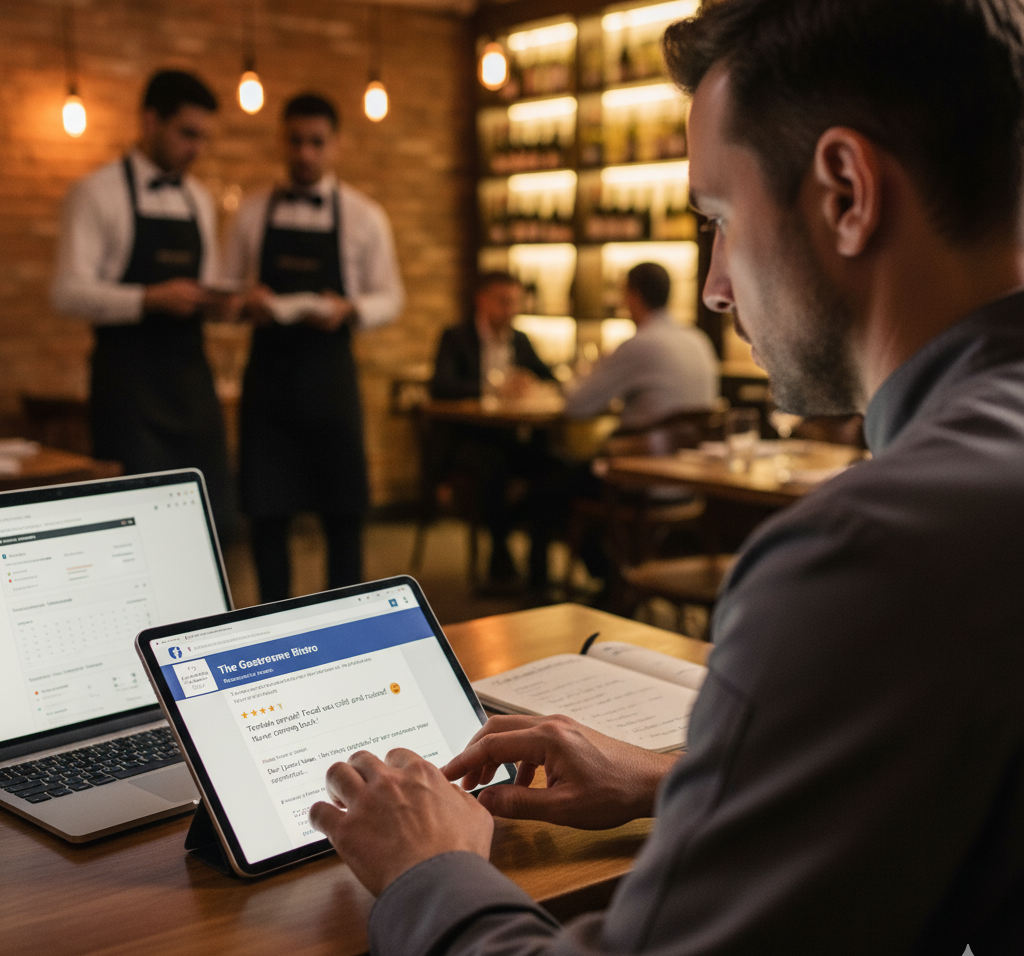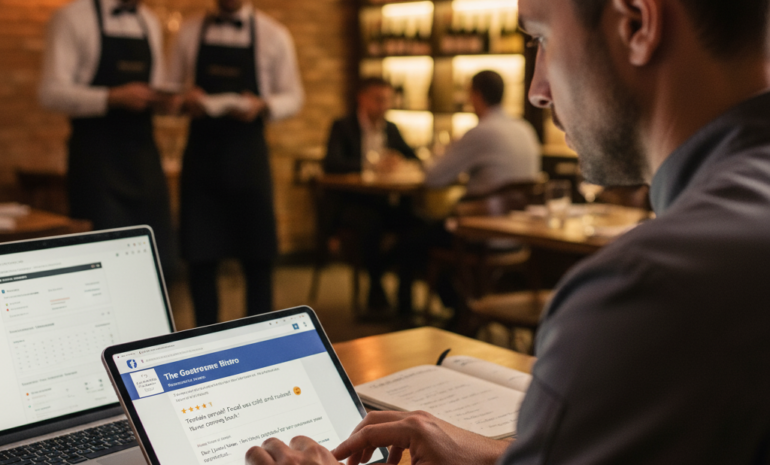Negative reviews can shake a restaurant’s reputation, especially when they appear publicly on Facebook, where potential customers read them before deciding to visit.
Many restaurant owners panic or ignore such reviews, which only worsens the situation.
Instead, responding strategically can actually help your business grow. Handling criticism well shows professionalism and care for your customers.
It proves you value feedback, even when it’s not positive. Each negative review is a chance to rebuild trust and demonstrate transparency.
The goal isn’t to remove all criticism but to turn these situations into opportunities for improvement and positive brand perception.
Effective Ways to Handle Negative Facebook Reviews for Restaurants
Learn practical methods to handle negative Facebook reviews with professionalism and empathy. Turn customer complaints into opportunities to strengthen your restaurant’s reputation and trust.
Understand Why People Leave Negative Reviews
Customers usually leave negative reviews when their expectations aren’t met. It could be slow service, rude staff, cold food, or an unpleasant atmosphere.
Sometimes the issue isn’t about food quality but how the complaint was handled.
Understanding the reason behind the review helps you address the core problem instead of reacting emotionally.
Read each review carefully and identify patterns in customer feedback. This insight can reveal operational weaknesses, allowing you to improve before more customers face the same issue.
The goal isn’t to defend your restaurant but to understand, resolve, and show genuine concern for customer satisfaction.
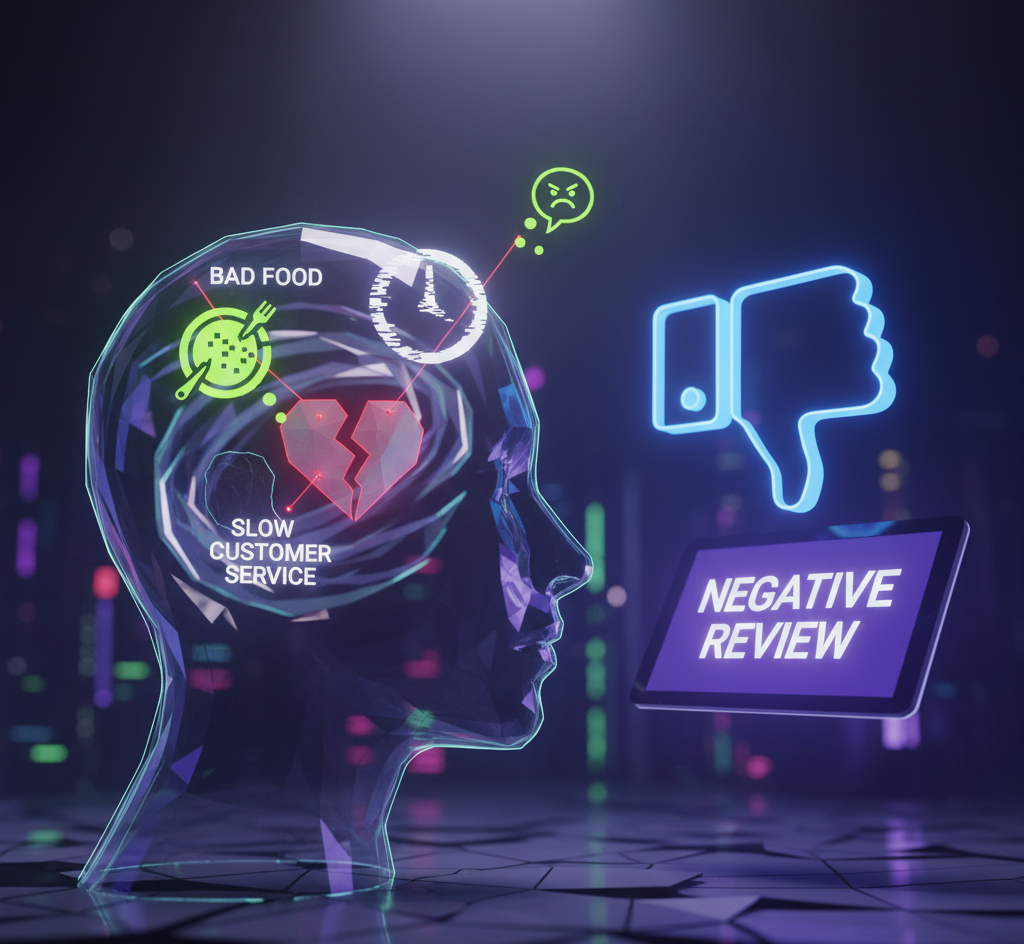
Respond Quickly and Calmly
Speed matters when handling online criticism. Responding within 24 hours signals professionalism and shows that customer opinions matter to your restaurant.
Keep your tone calm, polite, and empathetic; never defensive. Even a simple “We’re sorry to hear that” can diffuse tension if said sincerely.
Avoid using harsh or dismissive language that might escalate the situation publicly.
Your response will be seen not only by the reviewer but also by potential diners evaluating your reputation.
Quick, respectful communication demonstrates accountability and care, both of which influence future customers’ trust and willingness to dine at your restaurant.
Acknowledge, Apologize, and Act
Every unhappy customer wants acknowledgment first. Begin your response by thanking them for the feedback and apologizing sincerely for their experience.
Avoid excuses or blame-shifting. A good apology focuses on the customer’s feelings, not the restaurant’s defense.
Then, take real action; investigate what went wrong and correct it. If a server was rude or food was delayed, train your team to prevent recurrence.
After resolving the issue, follow up to inform the customer. This shows transparency and responsibility.
By taking visible corrective action, you can rebuild trust and even turn an unsatisfied guest into a returning customer.
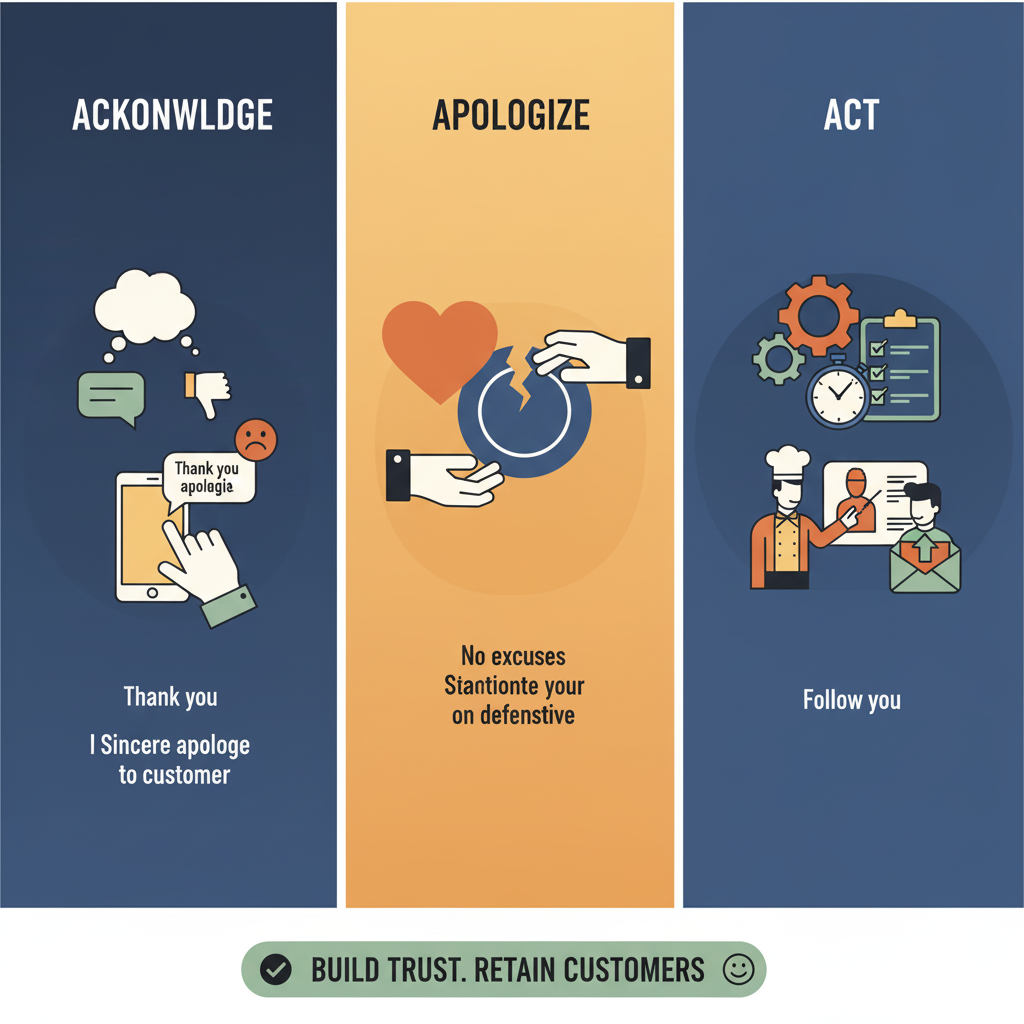
Take the Conversation Offline
Public arguments damage credibility faster than bad food. After acknowledging the review publicly, politely invite the customer to continue the conversation privately via Messenger, phone, or email.
This prevents further negativity in public view and allows you to discuss details constructively.
Offline conversations also show your willingness to resolve issues personally, which builds trust among other readers.
Keep your initial comment short, respectful, and professional. For example: “We’re sorry about your experience.
Please message us directly so we can address this right away.” Handling it privately helps you control the situation and maintain your brand’s reputation.
Learn from Repeated Feedback
If several reviews highlight the same complaint, like cold food, delayed orders, or rude service, it signals a systemic issue, not isolated incidents.
Instead of repeatedly apologizing, analyze what’s causing the problem. Maybe your kitchen is understaffed during rush hours or delivery coordination is weak.
Use this data to improve processes and train your staff accordingly. Once improvements are made, communicate them publicly to show you value customer input.
For instance, posting, “We’ve improved our delivery system for faster service,” reassures customers that their voices matter and helps rebuild trust with your audience.
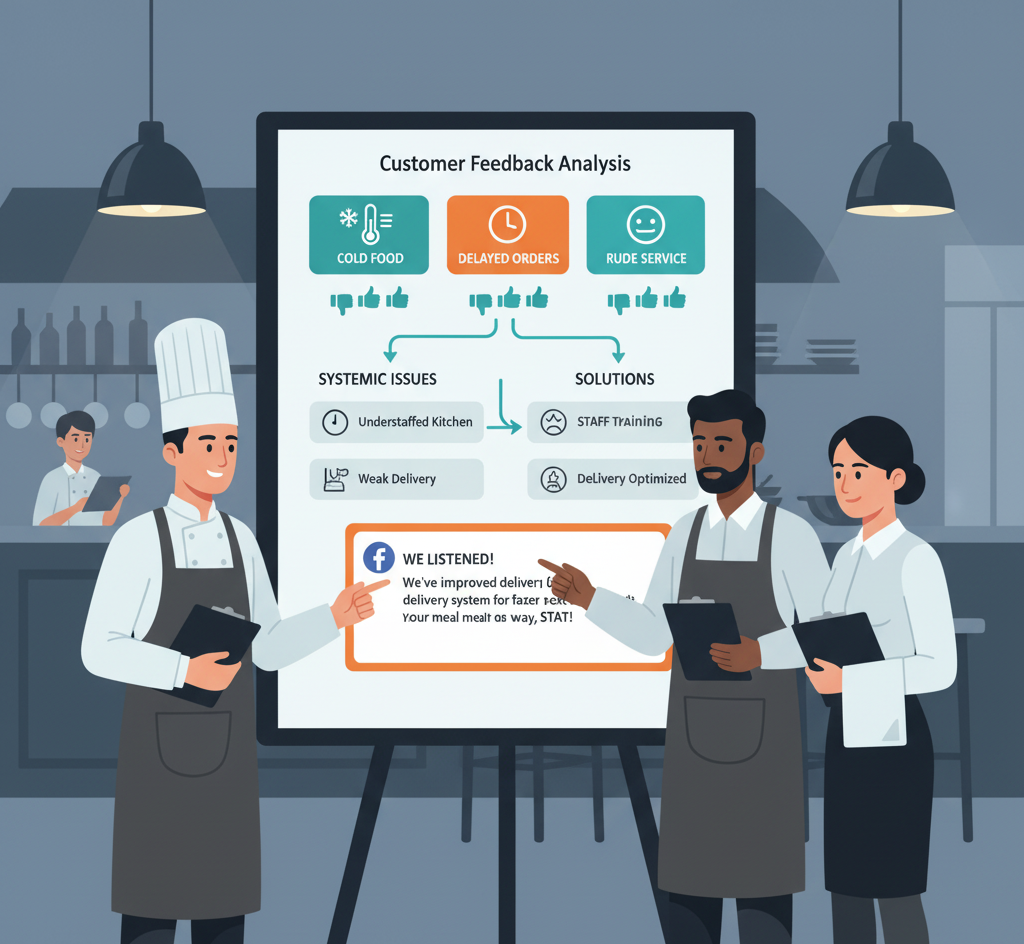
Encourage Positive Reviews
Positive reviews are your best defense against the occasional bad one. Encourage satisfied customers to share their feedback on Facebook right after their meal.
You can do this by placing QR codes on tables, adding a gentle reminder on receipts, or asking politely after service.
Make it easy for happy customers to leave a review; most people won’t unless prompted.
Highlight these positive reviews on your page to build credibility and push down negative ones.
When people see consistent positive feedback, they’re more likely to dismiss the occasional bad review as an exception, not the norm.
Report Fake or Malicious Reviews
Sometimes negative reviews aren’t from real customers but from competitors, bots, or spam accounts.
If a review looks suspicious or violates Facebook’s community standards, report it immediately.
Fake reviews often lack details or repeat identical complaints across multiple businesses.
Facebook allows admins to flag these reviews for removal. Keep records like order receipts or booking details to prove authenticity if needed.
Regular monitoring helps protect your page from unfair damage. Dealing with false reviews professionally, not emotionally, preserves your credibility and signals that your restaurant values transparency and fair customer feedback.
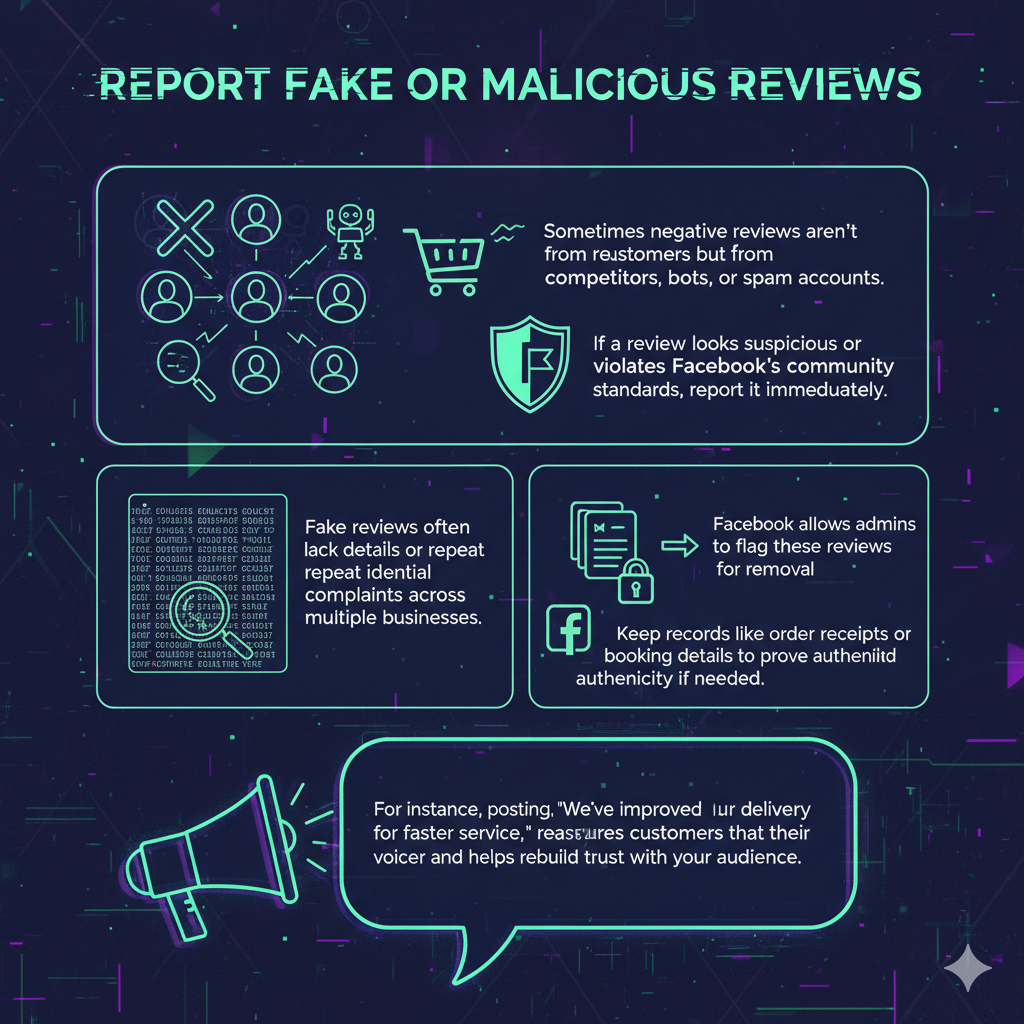
Turn Critics into Loyal Customers
Handled correctly, a negative review can become a marketing win. When a customer sees you responding kindly, fixing issues, and genuinely caring, it leaves a strong impression.
Many dissatisfied customers return when they feel heard and respected.
Offering a small gesture, like a complimentary dessert or discount on their next visit, can transform frustration into loyalty.
More importantly, others reading that exchange see your professionalism. Every response you post publicly represents your restaurant’s values.
Turning critics into advocates through empathy and action can build stronger long-term customer relationships than paid ads ever could.
Keep Monitoring Reviews
Managing online reputation isn’t a one-time task; it’s an ongoing process. Regularly check your Facebook Reviews tab or set up notifications for new feedback.
Quick replies show that your restaurant actively listens and values customer input. Use social media management tools if necessary to stay organized.
Monitoring also helps you catch emerging issues before they grow. The consistency of your responses builds a trustworthy image that attracts new diners.
A restaurant that listens, responds, and improves based on feedback always stands out in a crowded food market.
Consistent engagement keeps your online reputation healthy and strong.
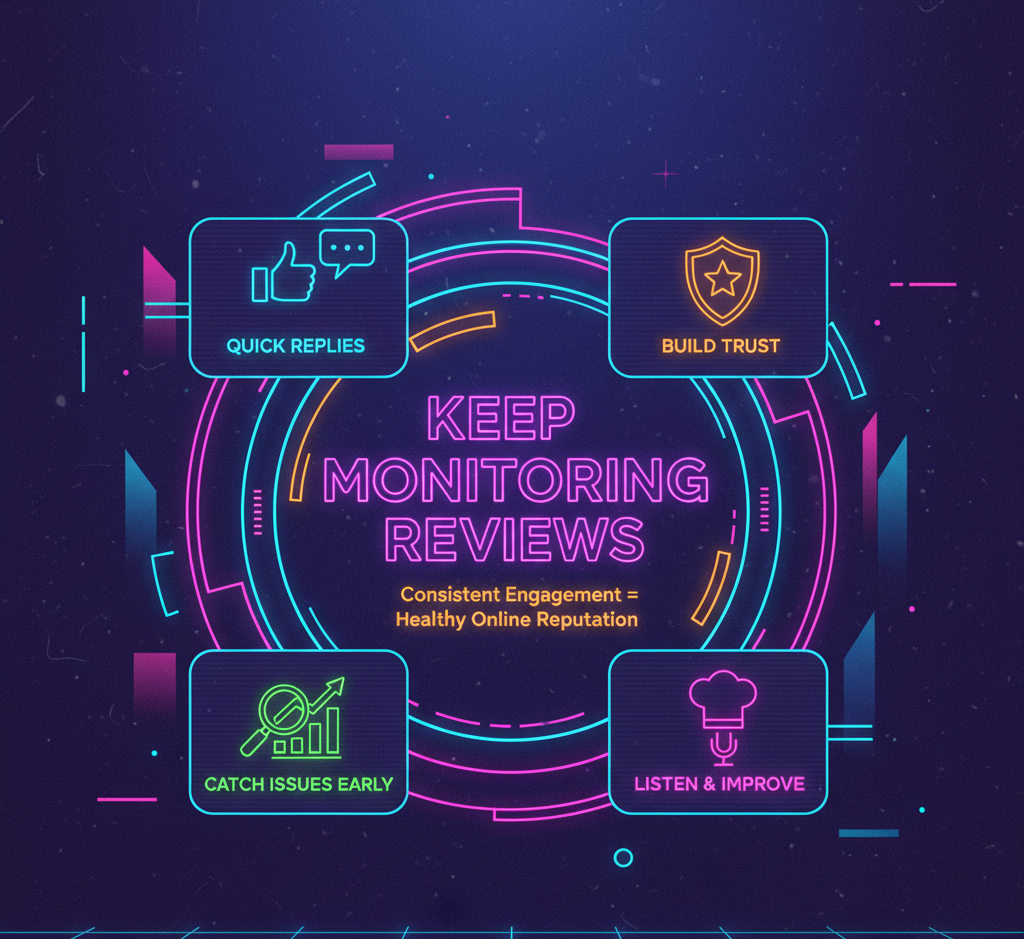
How Can Brandout Adv Help?
Brandout Adv helps restaurants manage their online reputation with smart digital strategies.
Our team monitors reviews, responds professionally, and builds systems to reduce future complaints.
We create response templates, train teams on tone, and integrate review monitoring into your Facebook strategy.
By handling criticism constructively, you don’t just save face; you build loyalty.
We’ve helped restaurant clients regain lost trust, attract new diners, and maintain a strong digital image.
Managing negative reviews isn’t just damage control; it’s part of brand management.
With Brandout Adv’s support, your restaurant can turn criticism into growth and strengthen customer confidence online.
Final Thought
Negative reviews are part of every restaurant’s journey, no matter how good the food or service is.
What separates a respected brand from the rest is how it reacts. A calm, solution-focused response shows professionalism and empathy, which customers value deeply.
By addressing concerns instead of ignoring or arguing, you demonstrate genuine commitment to customer satisfaction.
Each resolved complaint becomes proof that your restaurant listens and improves.
Over time, this approach not only minimizes the impact of bad reviews but also builds stronger trust and loyalty among your audience, turning criticism into long-term business growth.
FAQs
What should I do first after getting a bad review on Facebook?
Stay calm, read the complaint carefully, and respond professionally within 24 hours instead of deleting or ignoring it.
Can I delete negative reviews from Facebook?
No, Facebook doesn’t allow businesses to remove legitimate reviews. You can only report fake or abusive ones.
Should I offer compensation to unhappy customers?
If the complaint is genuine, offering a discount, replacement meal, or free visit can help rebuild trust.
How can I prevent negative reviews in the first place?
Train your staff, maintain food quality, and regularly collect feedback before customers resort to public complaints.
What if the reviewer keeps arguing publicly?
Stay polite and invite them to continue privately. Never argue online; it damages your brand image.
Can positive reviews help counter bad ones?
Yes, a steady flow of positive, genuine feedback improves overall ratings and pushes old negatives down.
How often should I check Facebook reviews?
Check daily or enable notifications to respond promptly and prevent small issues from escalating.
Why should I hire professionals for review management?
Experts like Brandout Adv ensure timely, polite, and strategic responses that protect your restaurant’s online reputation.

